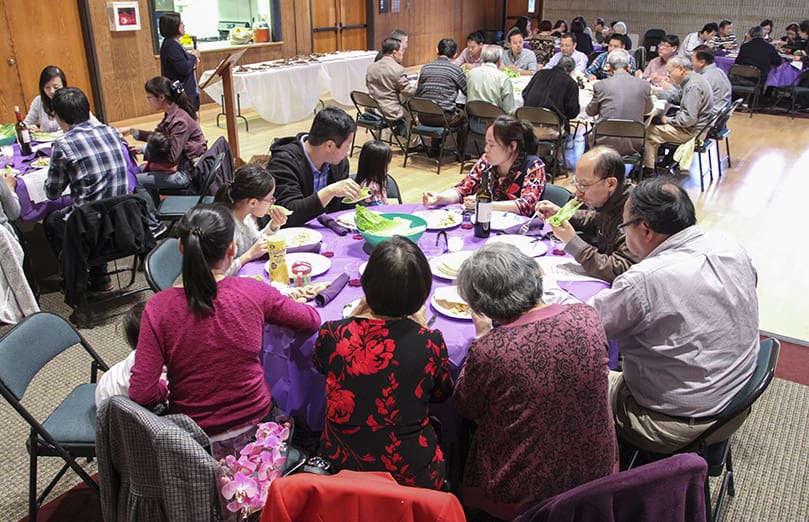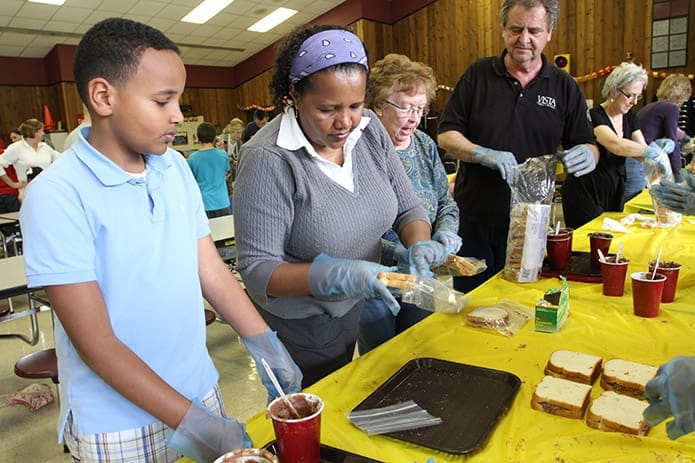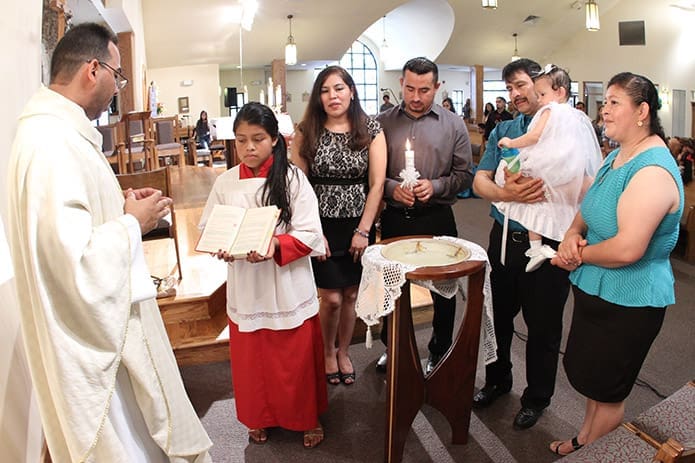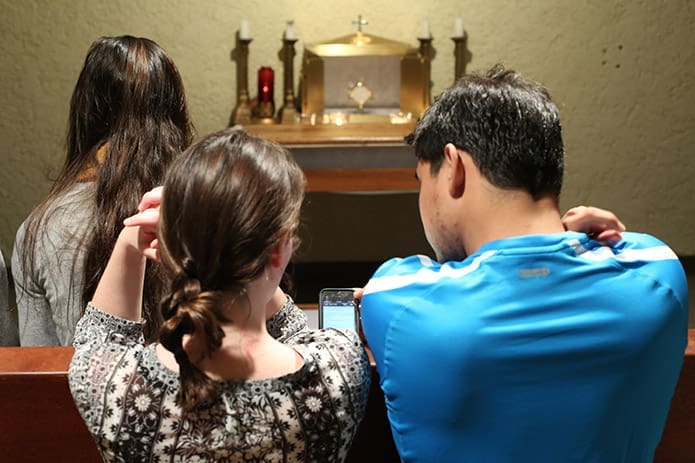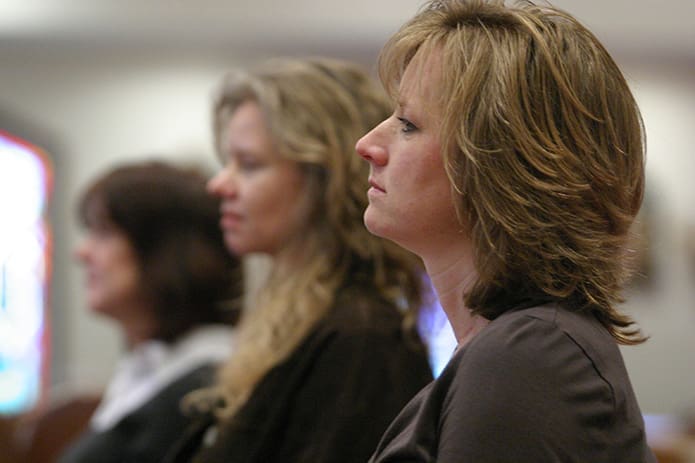One of the recommendations of the Pastoral Plan under the key issue, Knowing Our Faith, seeks to promote occasions where families can come together around spiritual and social activities. Members of the Chinese Catholic community participate in a March 22 Lenten retreat in remembrance of the Last Supper. Photo By Michael Alexander
Consensus is a hallmark of the Plan’s 14 priorities
By NICHOLE GOLDEN, Staff Writer | Published April 16, 2015
ATLANTA—Unveiling the five-year Pastoral Plan for the Atlanta Archdiocese, Archbishop Wilton D. Gregory has outlined the 14 priorities chosen as most critical by the laity, priests, religious and deacons of the Catholic community.
This is the “what” that needs to be accomplished over the next five years, Archbishop Gregory said. The exact method of “how” it will be implemented will be made concrete by the unique circumstances of each parish and mission, as its members respond to the plan.
“It is my well-founded hope that this plan is implemented in such an inclusive way that all who call north and central Georgia their home will feel very much a part of our family and will see themselves in this visionary statement,” he said.
He encouraged all people in the archdiocese to pray for success in implementing the recommendations.
“We have been abundantly blessed in this archdiocese,” wrote Archbishop Gregory. “We must use all the gifts and talents with which we’ve been blessed to build up God’s Kingdom here on earth.”
Since January, the archbishop has been meeting with groups of clergy in each of the 10 deaneries to review a draft of the plan and how to bring its goals to life. He has also met with the Council of Priests and Archdiocesan Pastoral Council.
On Monday, April 13, he led a meeting with the staff of the Chancery.
The Pastoral Plan, which is published in full in this edition of The Georgia Bulletin, will be posted online in six languages. Parishes are receiving a brief video, along with banners, posters and a pamphlet condensing its content. A website dedicated to the plan has been created at http://pastoralplan.archatl.com.
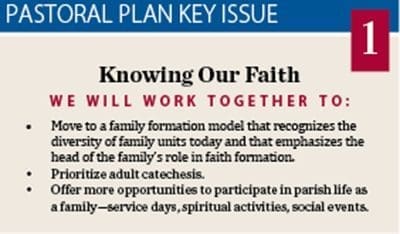 The plan’s 14 final recommendations are grouped under four themes: Knowing Our Faith, Living Our Faith, Spreading Our Faith, and Evolution of Our Parishes.
The plan’s 14 final recommendations are grouped under four themes: Knowing Our Faith, Living Our Faith, Spreading Our Faith, and Evolution of Our Parishes.
Archbishop Gregory spoke about them at the Chancery April 13, focusing on the need for the essential intertwining of doctrine and social teaching—to not only know but live the faith—and on the family formation model of religious education and truly welcoming people to parishes.
“Evangelization is a lot more than simply finding occasions for inviting people,” said Archbishop Gregory. “It is the way we live. It ought to be inviting.”
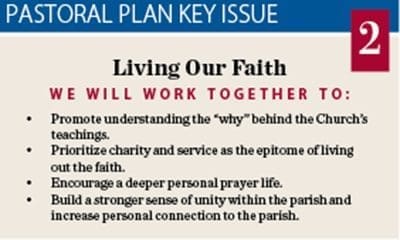 The plan’s recommendations emphasize the following:
The plan’s recommendations emphasize the following:
–Lay people and clergy of the archdiocese want a focus on family faith formation, while recognizing that what defines a family varies widely and pressures on families abound; they also want more emphasis on adult catechesis;
–Pursue a greater correlation between what faithful people know about church teachings and how they live their lives, with the Acts of the Apostles as an inspiration;
–Small faith communities can help people connect more deeply with one another and their parish, and more is needed to reach groups who feel disenfranchised from the church;
–Parish administration should be shared where possible so priests can focus on sacraments and catechesis; and parishes need to collaborate, sharing resources and successful models of ministry, with an emphasis on welcoming and including all cultures.
Plan affirms ‘people in the pews’
In the 69 counties of the archdiocese, Catholics of many backgrounds are gathering under the same roof to worship, noted Archbishop Gregory.
“There are 96 worshipping communities in the archdiocese. There are very few that are not multicultural. Our parishes all have a complexity of cultures and languages. … The pastor is trying to put his arms around all those people,” he said.
One of the archbishop’s favorite readings is on Pentecost from the Acts of the Apostles. People from many nations were speaking different languages, but all could understand the disciples’ words because of the Holy Spirit.
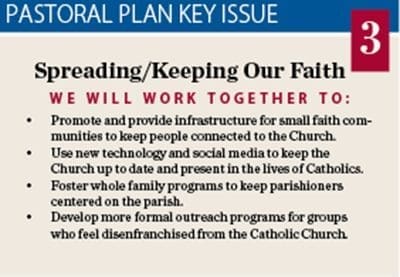 “That’s Atlanta. It’s going to take the Holy Spirit to welcome all those people and make them feel welcome and make them feel part of the Church,” said Archbishop Gregory.
“That’s Atlanta. It’s going to take the Holy Spirit to welcome all those people and make them feel welcome and make them feel part of the Church,” said Archbishop Gregory.
To begin to implement the plan, the archbishop asked each pastor and parish administrator to share the vision of the Pastoral Plan with church members; to form a parish team to prioritize the 14 recommendations for their specific faith community; and to create implementation teams to review current practices, develop new approaches and share the results with other parishes.
Msgr. Dan Stack is chairman of the Council of Priests and pastor of St. Thomas Aquinas Church in Alpharetta. In an email interview, Msgr. Stack said the Pastoral Plan “seems to be grounded in a vision of a Church in which our Lord is incarnate and makes his dwelling among us.”
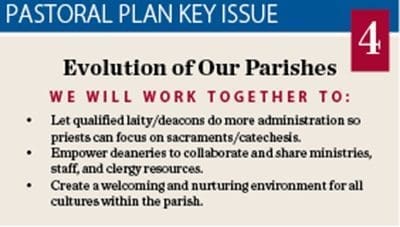 “From our experience of this incarnate Lord we go forth, then, to share him with others,” said Msgr. Stack. “This Pastoral Plan, to me, first affirms the ‘people in the pews’ and affirms their experience of the incarnate Christ. It then challenges us to deepen that experience of our Lord and to share that with our families and the larger community.”
“From our experience of this incarnate Lord we go forth, then, to share him with others,” said Msgr. Stack. “This Pastoral Plan, to me, first affirms the ‘people in the pews’ and affirms their experience of the incarnate Christ. It then challenges us to deepen that experience of our Lord and to share that with our families and the larger community.”
The pastor believes this plan will make his work easier, reversing the ministry model, by inviting him to counsel with parishioners to discover what God is calling them to do “and how we think we can best do that.”
“We have heard over and over Pope Francis’ expression that we priests need to ‘smell like the sheep.’ This Pastoral Plan will, I hope and pray, lead to a much more vibrant, faith-filled flock and more confident and fulfilled shepherds,” said Msgr. Stack.
At the Chancery meeting introducing the plan, which also outlines expectations for Chancery leadership and staff, Sister Margaret McAnoy, IHM, was vocal in her enthusiasm for this new course for the archdiocese. The vicar for religious ended the meeting with a resounding endorsement: “I have been an active member of the Atlanta Archdiocese for about 46 years. It’s about time.”
Votes at 12 meetings yield unanimity
Archdiocesan planner Peter Faletti and the pastoral planning committee led the efforts of local Catholics to articulate, define and refine the recommendations through the process.
 The Pastoral Plan journey began in March 2014 when the archbishop asked all Catholics, practicing or not, to respond to survey questions about areas of pastoral importance. The plan is the result of 20,000 survey answers, followed by recommendations from every parish based on the themes, and then a refinement of 400 recommendations down to the final 14. These came about through voting sessions held at the deanery level, the convocation of priests, and a session with deacons and religious.
The Pastoral Plan journey began in March 2014 when the archbishop asked all Catholics, practicing or not, to respond to survey questions about areas of pastoral importance. The plan is the result of 20,000 survey answers, followed by recommendations from every parish based on the themes, and then a refinement of 400 recommendations down to the final 14. These came about through voting sessions held at the deanery level, the convocation of priests, and a session with deacons and religious.
The growth of the archdiocese was one of the primary challenges considered during the development of the plan, said Faletti.
“People like to come here to live, work, play, retire. They like our 69 counties. We are going to have to continue to find ways to serve larger parishes,” Faletti told Chancery staff. “We have to figure out how to get room for people to come to the table.”
A striking occurrence during the process was that participants in the 10 deanery meetings, the convocation of priests, and the meeting of religious and deacons, all independently selected the same recommendations to be sent to Archbishop Gregory.
“I’ve never seen it before. It was 12 for 12,” said Faletti about the unanimity, which he attributed to the Holy Spirit. “I think we’re in the right place with the right recommendations.”
‘We have to own it’
In an interview, Auxiliary Bishop David P. Talley discussed what makes the church in the archdiocese so wonderful and sometimes challenging is its cultural diversity.
He emphasized that the Pastoral Plan doesn’t dictate how priorities are to be implemented. Its inspiration is Jesus’ Great Commission to take the Gospel to all peoples.
“Each parish will have a slightly different take,” said Bishop Talley.

The final recommendation under the key issue, Evolution of Our Parishes, urges creating a welcoming and nurturing environment for all cultures within the parish. Above, Brazilian teens come together in a circle of prayer at St. Jude the Apostle Church, Sandy Springs. Photo By Michael Alexander
The plan’s purpose is “to focus on what the Good Shepherd is asking,” said Bishop Talley. “It’s looking at renewal.”
Bishop Talley, whose responsibilities include overseeing the Office of Priest Personnel, discussed the recommendation that trained laity and deacons take on more parish administration.
“What we have to have is other people to help,” said Bishop Talley.
It’s about “lifting up those” with unique talents and experience, added the bishop.
Providing this strong assistance will enable priests to devote themselves more fully to sacramental ministry.
The example of Pope Francis is to look beyond the boundaries of the church in living and spreading the faith.
“He’s challenging us. Leave the building, leave the church,” explained Bishop Talley.
The Pastoral Plan is not a set of instructions coming from the top down on how a model plane should be assembled, said the bishop.
“This is an exhortation by the archbishop,” said Bishop Talley.
Sharing the faith is the baptismal call of each Catholic.
“We have to own it,” said the bishop.
“It’s not about Sunday,” said Bishop Talley. “It’s a 24/7 operation.”
He cited a March 29 conference for parents of children with disabilities, hosted by the archdiocesan Disabilities Ministry, as an example of more formal outreach to those who might feel disenfranchised or not included in the life of the church.
Service to parishes emphasized
Archbishop Gregory asked Chancery leaders to ensure that the priorities of the pastoral vision become staff priorities and to identify structural changes and resources needed to support parishes in carrying out recommendations.
By July 1, a central phone number and email address for Pastoral Plan questions will be up and running, as will a multicultural office to help parishes address the challenges of welcoming and meeting needs of all cultures.
Also, the advocacy ministries of Respect Life, Social Justice, Disabilities, and Prison and Jail Ministries will be realigned under the direction of the chancellor, Deacon Dennis Dorner, in order to work dynamically with permanent deacons.
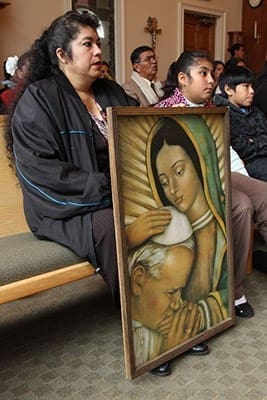
The Archdiocese of Atlanta’s rapidly changing demographics compels it to seek innovative methods to assist parishes with functioning in a multicultural environment in such a way that brings unity among the entire congregation. Photo By Michael Alexander
By Oct. 1, the Chancery will develop a means for parishes and missions to share information quickly and easily through digital networking.
“What we have to be is completely responsive to parish leadership,” said Dave Spotanski, chief operating officer of the archdiocese. “We have to make sure we can help them get answers.”
Spotanski shared a recent, poor customer service experience to demonstrate the need for central support of parish leaders and clergy. He went online to move his family’s existing cable/Internet bundle to a new location. After answering a series of online questions, Spotanski believed he had achieved his goal, only to be contacted later by the company’s customer service department.
After answering the same set of questions on the telephone, he was still unable to move the service to a new location and, after being put on hold, was handed off to another representative.
“We can’t be that here,” said Spotanski. “There’s a renewed commitment to customer service.”
The people in the pews need a positive experience and the inspiration to live the faith, he said.
On the Chancery level, helping the parishes to enact the recommendations in the Pastoral Plan is about finding answers and relaying information or resources to them quickly.
“It’s basic. It’s really just that simple,” said Spotanski. “We know. We share. Our parishes evolve.”
Archbishop Gregory emphasized that the foundation of any diocesan Pastoral Plan is the continued need to share the good news of Jesus Christ with others.
“With the confidence of Jesus’ unconditional love, hope prevails. A deep joy is possible even in the midst of trials and tragedy,” wrote the archbishop. “In Jesus is found happiness and a peace that the world cannot give. Jesus’ love is for you and for everyone.”
With a campaign introducing the Pastoral Plan of people asking “Am I in there?” the archbishop has answered, “Yes, each one of you is in the Pastoral Plan because the hope and the love of Jesus Christ are for each of you.”
The plan will be available in French, Korean, Vietnamese, Portuguese and Spanish, in addition to English, at the new website: http://pastoralplan.archatl.com.
Looking back at 1966 Archdiocesan Synod
5 Things To Know About The Pastoral Plan
Andrew Nelson contributed to this story.
